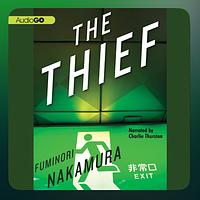Take a photo of a barcode or cover
dark
fast-paced
sehr kurzweilig; für diejenigen empfehlenswert, die heist mögen und eine gewisse sinnlosigkeit im leben sehen
Graphic: Death, Sexual content, Violence
Wow!
An interesting story told from the viewpoint of a successful pickpocket and all the skill required to do the job well. I look forward to more of his books
An interesting story told from the viewpoint of a successful pickpocket and all the skill required to do the job well. I look forward to more of his books
When will I learn to quit reading creepy, unsatisfying Japanese fiction?
”’Life is a mystery. But listen. Why did I turn up in your life in the first place? Do you believe in fate? Was your fate controlled by me, or was being controlled by me your fate? But in the end, aren't they just two sides of the same coin?’”
Not many thoughts, honestly. My experience with Japanese literature thus far has been that it tends to focus on exploring some aspect of the human condition through character-centric stories rather than plot-driven, action-packed tales meant to keep the reader hooked from beginning to end. There is something to enjoy about that approach, I feel.
That which was the thief’s ruination was also his salvation. Or was it? We are left to imagine whether or not such is the case. The paths that we are shaped by our environment into taking can lead us astray from the life most meaningful to us. Sometimes, even if we do everything right, we may still face suffering, for many things are simply out of our control. This is what it means to move about the world amongst one’s fellow man.
I've been a huge fan of Japanese crime/mystery fiction ever since I read Out by Natsuo Kirino. I started devouring Japanese noir books, loving Kirino, Kenzo Kitakata and some of Miyuki Miyabe's novels. I read a so-so review of the Thief in the Washington Post. It said that it wasn't a thriller or action-packed, but it seemed more of a reflection on the main character, a pickpocket. I thought that that's exactly what I loved about Japanese fiction I've read. The books I've read are a social critique of class, culture and regionalism.
Having just finished the book, I was a little disappointed. The book never really took off for me. I was interested in the story. Actually, there were two stories, one involving a criminal activity and one a father-son type relationship the main character develops with a young boy who seems to be a thief in the making. I think the author should have spent more time developing the relationship aspect. He could have moved the criminal part to the background.
Some have said this book is minimalist, but I think it's more underdeveloped. There was potential and I did want to finish the book and see what happened. For the first third or half of the book, I was thinking that I'd give it four stars. It finished off at three and I think that's about right for me.
Having just finished the book, I was a little disappointed. The book never really took off for me. I was interested in the story. Actually, there were two stories, one involving a criminal activity and one a father-son type relationship the main character develops with a young boy who seems to be a thief in the making. I think the author should have spent more time developing the relationship aspect. He could have moved the criminal part to the background.
Some have said this book is minimalist, but I think it's more underdeveloped. There was potential and I did want to finish the book and see what happened. For the first third or half of the book, I was thinking that I'd give it four stars. It finished off at three and I think that's about right for me.
This is a story of a pickpocket who gets caught in some bad shit. Thieves, much like junkies, are characters that are only likable in works of fiction. No one wants to be near them, let alone like them in real life. I guess this makes them strong literary tools to portray the isolation we all feel. So even though this is a book is about a Japanese pickpocket, it is easy to relate to.
Another question Fuminori asks via our anti-hero is about fate. "What will happen to me in the end. What happens to people who live the way I do? That's what I'd like to know", says our hero. The answer is of course, in the end, everyone ends up the same way. There is only one way a human life is heading, even when we do everything we were supposed to. All we can do it try to push the ending as further away as possible.
Altogether, this was thoughtful and entertaining at the same time. Loved it.
Another question Fuminori asks via our anti-hero is about fate. "What will happen to me in the end. What happens to people who live the way I do? That's what I'd like to know", says our hero. The answer is of course, in the end, everyone ends up the same way. There is only one way a human life is heading, even when we do everything we were supposed to. All we can do it try to push the ending as further away as possible.
Altogether, this was thoughtful and entertaining at the same time. Loved it.
adventurous
dark
mysterious
tense
fast-paced
Yazarın yazım tarzını çok beğendim. Sanki o an oradaymışım, o heyecanı, acıyı ben yaşıyormuşum gibi hissettim.
Fuminori Nakamura’s The Thief at the heart is a wonderfully-crafted piece of work, steeped in philosophy and darkness. Translated from Japanese for the first time, we follow the journey of the Thief; a pickpocket who roams the streets, relishing the thudding anticipation of the steal as he snatches wallets and watches seemingly at will. A psychological thriller, Nakamura takes us on a fascinating exploration of the criminal underworld, while offering mediation on human nature and fate.
This is no ordinary ‘crime’ novel, if indeed that label fits the mark; instead we delve deep into the mysteries of the human mind. Our pickpocket still has his gift, stealing with perfect precision – but something is missing; there is a void, an absentmindedness that he can’t seem to shake free. It is a sense of foreboding that plagues his waking dreams; he blacks out for long periods of time, returning to reality with no memory of what he has done since. The return of an old friend is the catalyst for our protagonist’s fall from fortune; snapping the thin thread holding his life in relative comfort, and plunging him into a downward spiral of ruthless mob leaders, from which he will struggle to escape. The past, then, sneaks up on our protagonist in the way that he so successfully manages to creep up undetected to his victims.
In truth then, the plot moves slowly in Nakamura’s text. The characterisation isn’t particularly strong, and as readers we are given next to zero information about our protagonist’s past – aside from a murmured name of a previous lover. Despite this, I believe this is the point – it works. The ambiguity of the novel adds to the tension and anticipation throughout, and I for one was interested to see where it would go next. At times it is slow going, but although the philosophical musings of our narrator and indeed the criminal that holds his life in his hands, are not particularly profound, they do much to infuse the story with an interestingness that makes up for the lack of plot.
Our protagonist, aside from being a talent in his field and ponderous in life, is also sympathetic. Through a sub-plot surrounding a young boy and his mother, Nakamura develops another level to his text and reveals more about the nature of our pickpocket. In a store he spots a mother and her son, poor and stealing from the shelves in order to put food in their stomach. He saves them from being caught, and as the novel progresses, reluctantly begins to take the young boy under his wing. It is interesting to watch as their relationship develops, and indeed how he comes to care for the boy. It is something that pleases him, fills the void that has begun to open; the emptiness and loneliness is replaced by a warmth when he gazes upon the boy that admires and looks up to him. I feel that throughout the text the author manages to craft a fantastic conflict in our protagonist: that blend of an introverted criminal forced to hide in the shadows of society, against the need to be a part of it. After all, even the most reclusive of people need someone in their lives.
The dénouement of The Thief is an interesting one. In some ways it feels almost unfinished; an ambiguous ending which answers no questions, and leaves the reader with perhaps a host of fresh ones. Yet in others there seems to be a strange sense of finality. Even we know not how things will turn out, in some ways whatever happens, this acts as a rebirth for our protagonist. I have heard from many that have raged against the ending of Nakamura’s novel, but I for one felt profoundly affect by it, and perhaps that was the idea: to leave the reader asking the questions hours after turning that final page.
Overall then, The Thief is cleverly written; offering a refreshing look at human nature, while at the same time providing us a glance at the seedy criminal underworld. Perhaps there will be some that will frown at the slow pace and ambiguous ending, but in my eyes it is a fantastic psychological thriller, that is more than worth a read.
challenging
emotional
reflective
tense
medium-paced
Plot or Character Driven:
Character
Strong character development:
Complicated
Loveable characters:
Complicated
Diverse cast of characters:
No
Flaws of characters a main focus:
Complicated
Well written and thought provoking, just not my preferred genre







